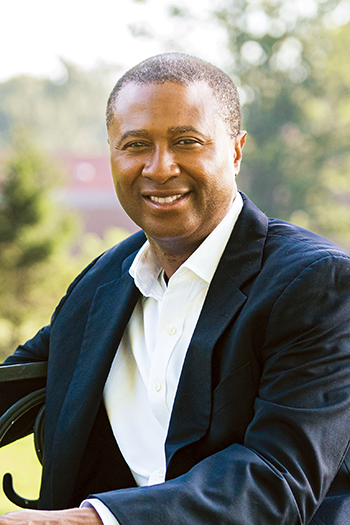
In Catholic health care, leadership includes a deep understanding of Catholic identity and a pledge to thoughtfully steward organizations to emulate the healing mission of Jesus.
As I reflect on what it means to me to be a servant leader in the ministry, I think about the life of Moses. In fact, his life story could serve as a master class in what it means to be a leader. The principles cast by Moses' leadership, his response when called by God and the lessons he imbued in those who surrounded him offer inspiration and instruction to both new and seasoned leaders today.
NATURE VERSUS NURTURE
Before diving into the life and leadership of Moses, let's first consider a question: Are leaders born or are they made?
Have you wondered how certain individuals ended up in key leadership positions? If you are like me, at various times in your career, you may have found yourself thinking, "Wow, this person is a natural-born leader." And at other times, you may have asked yourself, "How in the world did this person get appointed to such an important leadership position?"
Personally, I think the question of whether a leader is born or made is a trick question. In my opinion — and certainly when I think about Moses and many other inspiring leaders — it's clear that the best leaders are both born and made.
HEEDING THE CALL TO LEADERSHIP
In Jeremiah 1:5, God says, "Before I formed you in the womb I knew you, before you were born I dedicated you, a prophet to the nations I appointed you."
This verse is one many people are unaware of or overlook, but it speaks directly to how God gave us the inherent ability to lead. For me, the verse wonderfully clarifies that most of us are not made simply to wander this world as a passive follower; we are here to lead in the most amazing ways. Moses is generally considered the most important prophet in Judaism and one of the most significant prophets in Christianity and Islam — a beautiful trifecta. He was the man God anointed to bring redemption to His people. God specifically appointed Moses to lead the Israelites from slavery in Egypt to freedom in the Promised Land. This was an amazing feat under extraordinary circumstances that could not have been accomplished without Moses' innate leadership and intentional mentoring and leadership development from God.
Born leaders are often given opportunities, and it is up to them to act upon these opportunities based on their own free will. Yet, in many circumstances, born leaders evolve into even better ones with the right amount of encouragement and personal investment.
Assuming this viewpoint about leadership is correct, I offer a few lessons I've learned during my career that I recommend to emerging leaders in Catholic health care:

Courtesy of Hospital Sisters Health System
Lesson 1: The chance to be mentored or called to lead may not always align with your timing.
Moses' leadership development began to take root during his encounter at the burning bush (Exodus 3:3-4), where God called Moses to save
God's people. Many people miss their opportunity for greatness because they feel the timing isn't right. We might think it's too early in our careers; we don't have the right experience; we want to begin or just started a family; or we feel comfortable
doing what we are doing right now and don't see the need to change.
My advice is to get out of your comfort zone. Moses initially did not want to accept God's invitation to lead. He came up with several excuses; one was that he was not a good public speaker. He even requested that God send someone else instead of him. But after realizing this incredible moment may, in fact, be his "defining" moment and a chance to show God his unwavering trust and belief that God ultimately would provide the means to be successful, Moses reluctantly accepted. That decision paved the way for Moses to receive God's mentoring in many other ways.
Lesson 2: Lean into leadership moments with courage and confidence.
Once selected for a leadership role or challenge, go for your goals and responsibilities with gusto. Be confident, never arrogant. If you feel uncertain, have faith
that the right mentor or set of circumstances will provide you with what you need to succeed. In the case of Moses, once God laid out the plan for him to go to Pharoah and demand he let the slaves go to freely worship their God, Moses received support
from his brother, Aaron, and additional experiences that would prove he was worthy to fulfill such an important request.
Don't forget: It was Moses who had to exude the necessary courage and confidence to accomplish this feat. Ten times — or through 10 plagues, in this case — Moses had to prove to a stubborn Pharoah that he should listen to him and let God's people go. I mention this because, along the way, all leaders encounter doubters and skeptics, or as my 10-year-old daughter, Shelby, would say, "The haters, Dad." Like Moses, stay focused and determined. When you have the right goals and vision and God is at the center of your endeavors, you will eventually prevail.
Lesson 3: Make subsidiarity foundational to your leadership.
The following story comes from the Book of Exodus 18:13-23:
"The next day Moses sat in judgment for the people, while they stood around him from morning until evening. When Moses' father-in-law saw all that he was doing for the people, he asked, 'What is this business that you are conducting for the people? Why do you sit alone while all the people have to stand about you from morning till evening?'
Moses answered his father-in-law, 'The people come to me to consult God. Whenever they have a disagreement, they come to me to have me settle the matter between them and make known to them God's statutes and instructions.'"
Moses' father-in-law then said this approach was not wise, and that Moses needs assistance, as his approach will wear him out. He said Moses should bring disputes to God and instruct people in "how they are to conduct themselves and what they are to do." But he advises Moses to appoint leaders over groups "of thousands, of hundreds, of fifties, and of tens" who can solve the most common disputes while Moses focuses on major cases. "Lighten your burden by letting them bear it with you! If you do this, and God so commands you, you will be able to stand the strain, and all these people, too, will go home content." The passage speaks to the principle of subsidiarity, a key part of Catholic social teaching. Subsidiarity is a principle that proposes, when possible, leaders should defer matters to those working at the ground levels of an organization or to the least centralized competent authority rather than reserving everything for higher and more distant levels and authorities.
Had Moses not taken this advice, he could've succumbed to a condition plaguing many of today's Catholic health care leaders: burnout. Leaders who are frustrated by carrying too heavy a workload — or who have become tired and uninspired by the work itself — should ask: "Am I the only one who should be doing this work? Who else can do this work?" It is easy as one climbs the proverbial ladder to think: "Well, I'm here for a reason; I must be smarter and better than everyone else." Or one can think, "I have to do all this work myself if it is going to get done the right way."
In all honesty, I have fallen prey to these same thoughts. And the truth is, no one else can do the work exactly the same way I would. But that's because each of us is one of a kind. That doesn't mean others aren't capable or can't help with the workload.
Lesson 4: Leaders are only as good as those who surround them.
It is fitting to close with a story about the final years of Moses' life. A number of scholars estimate he lived for around 120 years. One of the least-spoken stories
— from Exodus 17:8-13 — involves one of his final miraculous acts that took place close to the end of his life.
The Israelites had not reached their ultimate vision to make it to the Promised Land, and one more enormous challenge stood in their way: an opposing force.
Amalek came and waged war against the Israelites in Rephidim. "Moses said to Joshua, 'Choose some men for us, and tomorrow go out and engage Amalek in battle. I will be standing on top of the hill with the staff of God in my hand.'
Joshua did as Moses told him: he engaged Amalek in battle while Moses, Aaron, and Hur climbed to the top of the hill. As long as Moses kept his hands raised up, Israel had the better of the fight, but when he let his hands rest, Amalek had the better of the fight.
Moses' hands, however, grew tired; so they took a rock and put it under him and he sat on it. Meanwhile Aaron and Hur supported his hands, one on one side and one on the other, so that his hands remained steady until sunset. And Joshua defeated Amalek and his people with the sword."
The takeaway? No matter how capable an individual leader may be, that leader must surround themself with people who are smarter, more talented and more skilled to ensure success in meeting any challenge ahead. Our Catholic faith calls us to live and to flourish in community with one another. We, too, are stronger when we work together.
DISCOVER THE LEADER IN YOU
So, we revisit the fundamental question: Are leaders born or made? Again, I would suggest both. As you reflect on Moses as a "master class" leader, ask yourself:
- What kind of leader are you?
- Will you rise to meet a call to lead?
- Can you accept help from others when needed?
- What kind of people will you choose to surround yourself?
The answers to these questions will influence both your professional and personal success.
DAMOND W. BOATWRIGHT is president and chief executive officer of Hospital Sisters Health System in Springfield, Illinois. He currently serves as the chairperson for CHA's board of trustees.
